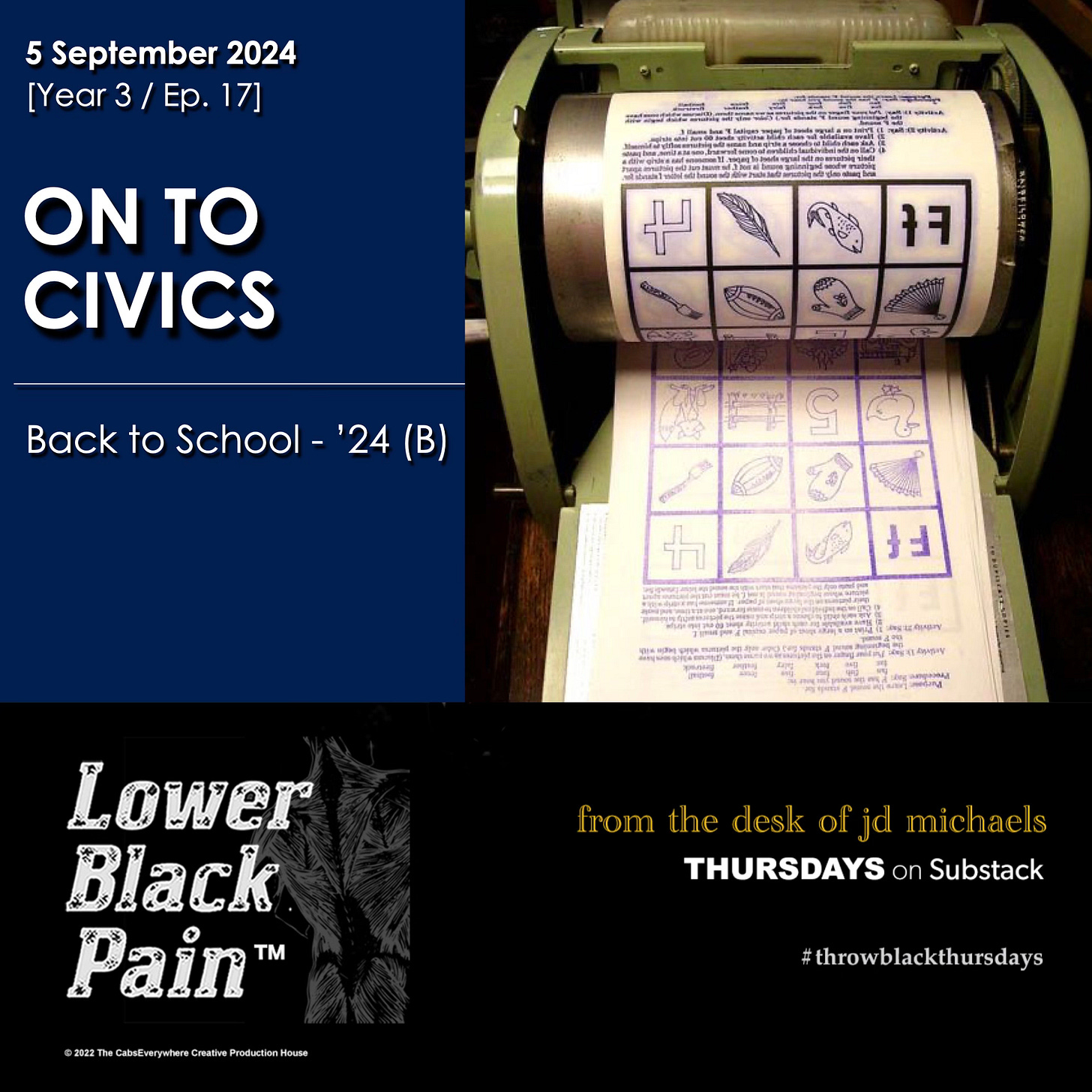At my grade school, it was just reading, writing, and arithmetic for a while, and then science and social studies came along.
Science focused on nature at first, eventually evolving into fun experiments like baking soda volcanos and lemon batteries. Social studies began as cartography: the class would look at giant maps requiring WWE strength for the teachers to pull down, like huge window shades mounted on top of the blackboards. We learned the names of different colored shapes - Earth’s continents, countries, states, counties and cities. Eventually the lessons began to describe how the lines defining these colorful shapes had been drawn, which led us to the joyful huffing of purple mimeograph sheets filled with Important Dates.
Declaration of Independence signed - July 4, 1776
That was the main one. I’m sure there were more, it’s just been a while. (Ooo! Norman Conquest! 1066! #stillgotit)
Social Studies evolved into History class, which should have been easy lists of “things that happened”. But for me it was always “why” they happened that was the most interesting part. There was an 80’s PBS series titled “CONNECTIONS” that offered a few clues as to the complexity of history’s WHYs, but in class our teachers would shrug and tell us they didn’t know, and SOCIETAL CONTEXT would not be on the exams.
In recent years the world of academia has gotten a bit more Indiana Jones and unearthed further detail about society’s recent past, often shifting our perspectives. For instance, I was shocked to learn that the past didn’t smell all that great…I hadn’t actually thought about it, just had the urge to visit London in the 1860’s if a time machine showed up - but then I was taught about The Great Stink, which wasn’t in any Dickens novels or Sherlock Holmes stories. Eeesh.
Also, the past isn’t moving, but it’s creeping up on me. I used to think of “the past” as far away. Words like “established” and “historical” meant that somebody’s grandparents had to be involved… horse-drawn carriages rumbling down cobblestone streets while tinny tenor voices spring from Victrola™ machines through open bay windows.
Now words like that are used to describe breakfast cereals, and I own objects that are on display in museums. There is more history being discovered, and more being created, every day.
One would think that more information offers greater clarity, like the resolution of pixels in a photoshop document. The context I longed for in school should be easy to plot out now with a few internet searches; in many cases that is true, as information springs to light that I either forgot or was never aware of. It’s weird to think that even though the past has happened already, it can still surprise us.
For instance, my mother turned 21 in 1962. As viewed through my life, that meant that she could legally vote and publicly enjoy as many adult beverages as she wanted.
Turns out she wasn’t an adult beverage sort of person and did NOT have the right to vote in 1962. This was confusing because the 19th Amendment secured voting rights for American women in 1920, yet the right for black women to vote (of which my mother is one) was not legally established until the Voting Rights Act of 1965. (The VRA nationally barred discrimination and overruled all state and local restrictions.)
So my mother’s first legal vote was at 27, which she remembers because I was there - I was a two year old, probably in a little suit and bow tie and a jaunty hat (she dressed me up for special occasions). This event happened IN MY LIFETIME, her basic right to vote in her home country.
She didn’t have the right to open a bank account without a man’s signature until 1974 (she already had one because the local black owned bank was more progressive). Credit cards weren’t available to her until 1974, two years before Star Wars opened. Carrie Fisher couldn’t get a MasterCard. And I could not have been a legacy at Yale as my mother could not have attended until 1969. All of these changes were truly historical, but uncomfortably recent.
One more thing: I am now, for various reasons, paying much closer attention to laws and their creation. Dozens of people scripting and revising specific language until it defines a situation which can be enforced and defended. Pretty impressive.
A few years ago I bought 6 very thick books about the United States Constitution and all the fun and hijinks that surrounded it. Did I read all 4268 pages? No, I did not. I did read the Constitution, and really enjoyed a pop-up book about the Bill of Rights, but the main thing I realized is that the United States is written on paper.
Imagine people standing around until someone writes down rules of a game on a sheet of paper to start folks off. Society is that fragile sheet of paper. Not a stone tablet, or even a lower back tattoo, just PAPER.
Even in this age of absolute miracles, when humans have visited the moon and traveled at the speed of sound, if an idea is really important, what do we do? Write it down. Sure, we use computers to print it, but we still sign actual pieces of paper. That makes it law. That makes it real. That makes it history.
Paper is what ties history together. Books, maps, handwritten notes, sketches and calculations and for-goodness-sake MONEY. Paper holds our clues to the past, and is what we are using to plot our future. Wow. I thought it might be gunpowder or salt or oil or something, but those things don’t last.
Paper. Explains why I could always check out without a receipt, but I feel so much more secure when I get one.














Share this post